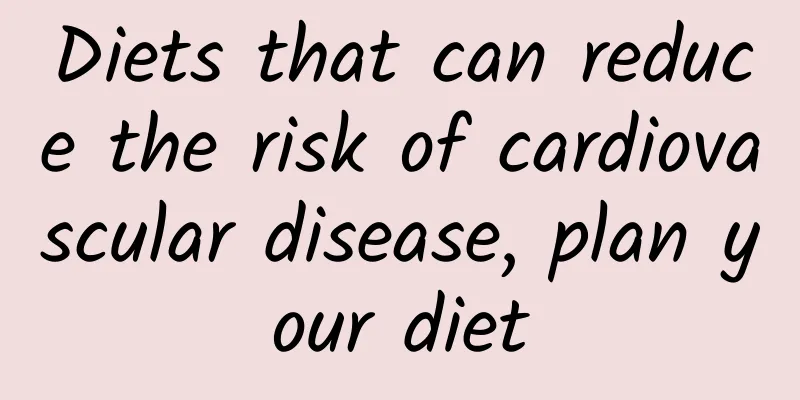Diets that can reduce the risk of cardiovascular disease, plan your diet

|
In recent years, with the increasing incidence of cardiovascular diseases, people are paying more and more attention to the prevention and treatment of cardiovascular diseases. In addition to exercise, more and more studies have shown that cardiovascular diseases are closely related to diet. So what are the foods that can prevent cardiovascular diseases? The first type of food that is undoubtedly rich in vitamins is food. Dr. Lehmann, who specializes in vitamin research in Germany, has made it clear based on his years of dedicated research that "lack of vitamins E, C, and A poses a greater risk of myocardial infarction than high cholesterol." American nutrition professor Bloomberg also said: "Taking adequate amounts of vitamins can prevent many diseases including heart disease, cataracts, diabetes and cancer." An article titled "Dietary Therapy for Preventing Cardiovascular Disease" published in Science Today in 2000 pointed out that among more than 300 doctors with heart disease in the United States, the risk of myocardial infarction was reduced by 50% for men and 20% for women after they took vitamin A regularly [1]. So how do vitamins affect cardiovascular disease? This article also gives the answer: vitamins have many physiological functions, such as improving blood circulation, maintaining normal blood vessel elasticity, anti-oxidation and clearing free radicals. Among them, vitamin B can clear the body of harmful substances that harm the heart - homocysteine. It seems that we can start arranging foods rich in vitamins, such as carrots, tomatoes, kiwis, green leafy vegetables, etc. Another type of nutrient that is friendly to cardiovascular disease is lecithin. Some people may be unfamiliar with this substance, while others may be familiar with it. Many patients with dyslipidemia and cardiovascular disease take lecithin to help lower blood lipids and thus improve vascular diseases. Lecithin is a special kind of fat. After being absorbed into the body, it will reduce the fat and cholesterol particles in the blood, keep them in suspension, and reduce the chance of fat depositing on the blood vessel wall, thereby reducing arteriosclerosis. Researchers once gave cardiovascular patients 2-6 tablespoons of lecithin extracted from eggs every day. After a few months, the cholesterol levels of these people dropped significantly and their heart function also improved accordingly. In addition to eggs, pig blood, soybeans, and sesame seeds are also rich in phospholipids, so you might as well eat more of them. However, it is important to note that if your intestines are not in good condition, supplementing with lecithin may increase the risk of cardiovascular disease. Therefore, before supplementing with lecithin, it is recommended to adjust the intestinal flora first [2]. In addition to the above two nutrients, selenium also has an impact on cardiovascular disease. The article "Dietary Therapy to Prevent Cardiovascular Disease" points out that selenium protects the heart by anti-oxidation (cooperating with glutathione peroxidase) and antagonizing toxic substances (cooperating with vitamin E). In fact, the incidence rates in some countries also suggest that selenium may be related to heart disease. For example, countries like Finland and New Zealand have low selenium content in the soil, but the mortality rate of myocardial infarction is quite high. It is undeniable that selenium is indeed a non-chemical element, but it is also an essential nutrient for animals. Therefore, proper supplementation of selenium is also beneficial to cardiovascular health. Butter, mushrooms, lobster, garlic, etc. are rich in selenium. As people's living standards and lifestyles change, cardiovascular diseases have become more and more common among younger people. Active prevention of cardiovascular diseases should not only be reflected in the elderly, but we young people should also respond in a timely manner. We should promote and practice healthy lifestyles such as diet therapy and exercise that are beneficial to the cardiovascular system. References: [1]. Kong Fanzhen. Diet therapy for preventing cardiovascular diseases[J]. Today's Science and Technology, 2000, 000(008):26-26. [2]. Yu Guoying. Gut microbial metabolism of lecithin and cardiovascular risk[J]. Chinese Journal of Cardiac Pacing and Electrophysiology, 2013(5):470-470. |
<<: Which is faster, thunder or lightning? Why does lightning make a sound?
>>: What are the advantages of a smart toilet? How to maintain a smart toilet
Recommend
Postpartum rheumatic symptoms
Postpartum rheumatism is a relatively common dise...
No menstruation after DDS electrotherapy
Some women may go to the hospital for body-contro...
The process of inducing labor by taking medicine for three months
Nowadays, many young people experience unexpected...
This treasure vegetable is the "little ginseng" of autumn and winter. You will miss out if you don't eat it.
Radish is a seasonal vegetable in winter, and &qu...
What is the fetal heart rate when pregnant with a boy?
Pregnancy is the happiest stage for women, and be...
What are the chances of infertility after abortion?
Some people who have a baby will generally choose...
Why do I feel bloated and painful in my lower abdomen after sex?
The causes of lower abdominal distension and pain...
How long does it take to detect twins during pregnancy?
Many women are very anxious to know whether they ...
Why are girls afraid of cold?
For girls, if they are afraid of cold, they must ...
There are several types of ovarian cysts
Ovarian cysts are a common disease among women. W...
Do I need to take anti-inflammatory drugs after having an IUD inserted?
IUD insertion is a method of female contraception...
Can I use a hair dryer to wash my hair during confinement in summer?
The confinement period is still only one month, b...
How to tell if lochia is smelly
After giving birth, women need to clean up the re...









